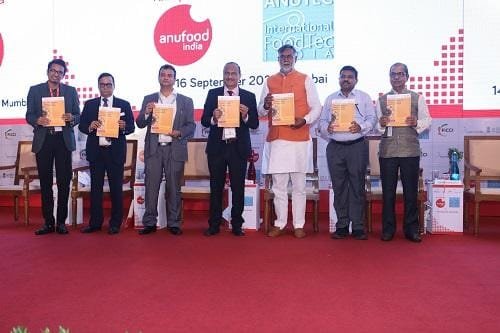Report says $11bn FDI received by food processing industry
The Indian food processing sector is expected to grow to over half a trillion dollars by 2025, from ~US$260 billion in 2020, achieving a CAGR of over 15%, according to an industry report.
Over the years, the sector has also received US$11+ billion Foreign Direct Investment (FDI) in two years.
The food processing sector allows 100% FDI through the automatic route. As a result, the sector has attracted FDI of more than US$11 billion through organic as well as inorganic routes from April 2000 to March 2022.
The industry growth is expected to be driven by a fast-changing market, much-needed government impetus, capacity and capability building as well as foreign investment, said the report ‘Food Processing Sector in India: Opportunities and Challenges’.
It also notes that despite the sheer production power that India has in terms of the food sector, it continues to be affected by problems such as high wastage, low processing levels and lower technological integration in farming, among other challenges.
The 2022-23 report by Nexdigm, along with the Federation of Indian Chambers of Commerce and Industry (FICCI), was released by Prahlad Singh Patel, Minister of State, Ministry of Food Processing Industries, at the 15th edition of the AnnapoornaAnufood 2022 Conference held at the Bombay Exhibition Centre in Mumbai on 16 Sept 2022.
Primary produce still constitutes 50% of the food sector, showcasing the immense potential for food processing and value addition in India. The food processing sector is constituted of six major sub-sectors (Dairy, Fruits and Vegetables (F&V), Animal and Poultry, Marine, Grains and Cereals, and Consumer Foods) supported by the Cold Chain sector.
India ranks 1st in milk production and 2nd in F&V with the top position in select items. It also has the largest livestock population (cattle and buffalo), is the leading exporter of buffalo meat, ranks 2nd in egg production, and is among the top 3 countries in terms of fisheries and aquaculture.
The level of processing across each of these sub-sectors range from levels as low as 5% to a maximum of 35%. These processing levels average out to only about 10% at an overall level, which is much lower in comparison to developed economies and some other developing economies.
Wastage, as high as up to 40%, is seen across sub-sectors, which opens a host of opportunities for scaling the warehousing and cold chain infrastructure, thereby increasing the scope of food processing in the country, according to the report.
Arun Chawla, Director General, FICCI, commented on the report, “Food production within the country always reached a net positive. However, wastage during storage and transport has been high.
“This can be managed with better farming methods, supply chain efficiencies and processing of the produce for value-added products.
“Processing can help preserve these products for a longer time, create a variety of value-added products that are in demand, fetch more value globally and upgrade the entire value chain of the food sector.”
According to Mayank Lakhani, Senior Managing Director, Nexdigm, “Many large processing companies have entered the Indian market, either by setting up their own facilities or via mergers and acquisitions.
“Such large greenfield investments range between US$100 million to US$300 million. Furthermore, while the total number of M&A deals in this sector may be modest, the total deal value has been quite significant, increasing from US$50 million in 2020 to US$876 million in 2021 for disclosed deal sizes.”
The report recognizes the efforts by the Indian Government, which had launched several initiatives and incentives to boost the sector. According to the report, 60 applicants have been approved for the Production Linked Incentive (PLI) scheme for value-added food products. These applicants include large players such as ITC, Haldirams, Nestle, Amul and Parag Milk.
The report also notes that Indian laws are now aligned with CODEX, allowing a degree of standardization on various laws internationally applicable to food and agriculture-related businesses. It underscores the need for food businesses and other stakeholders to keep partaking in representations on draft regulations for the inclusive evolution of food laws.
While providing an overall positive outlook, the report concludes that the sector is poised for exponential growth that will see India move up the global rankings to become one of the top food processing countries. fiinews.com










